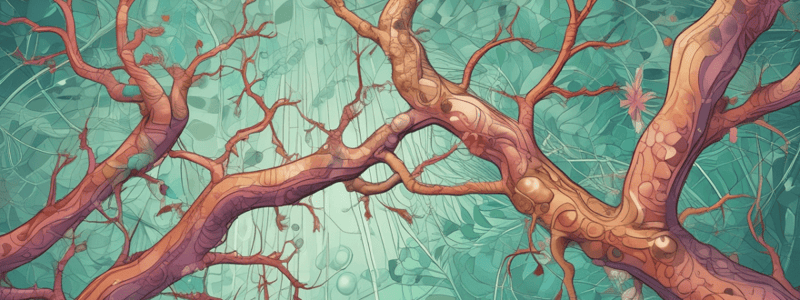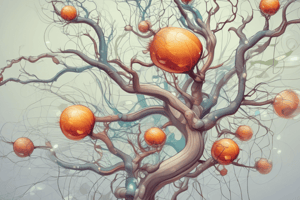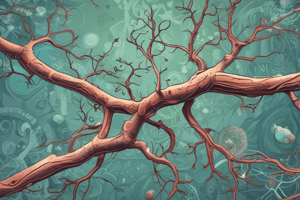Podcast
Questions and Answers
What is the study of interactions between organisms and their environment?
What is the study of interactions between organisms and their environment?
- Ecology (correct)
- Botany
- Genetics
- Microbiology
What is the function of mitochondria in a cell?
What is the function of mitochondria in a cell?
- Cell growth regulation
- Protein synthesis
- Energy generation (correct)
- Cell membrane formation
What type of molecule contains genetic information?
What type of molecule contains genetic information?
- Nucleic Acids (correct)
- Lipids
- Proteins
- Carbohydrates
Flashcards are hidden until you start studying
Study Notes
Branches of Biology
- Botany: study of plants
- Zoology: study of animals
- Microbiology: study of microorganisms
- Ecology: study of interactions between organisms and their environment
- Genetics: study of heredity and variation
- Molecular Biology: study of biological molecules and their interactions
Cell Biology
- Cell: basic unit of life
- Cell membrane: semi-permeable membrane that surrounds the cell
- Cytoplasm: jelly-like substance inside the cell membrane
- Nucleus: controls cell growth and reproduction
- Mitochondria: generates energy for the cell
- Ribosomes: site of protein synthesis
Evolution
- Natural Selection: process by which populations adapt to their environment
- Speciation: formation of new species
- Fossil Record: chronological record of the history of life on Earth
- Homologous Structures: similar structures in different species that have a common ancestor
Ecosystems
- Producer: organism that makes its own food (e.g. plants)
- Consumer: organism that obtains energy by consuming other organisms
- Decomposer: organism that breaks down dead organic matter
- Food Chain: series of organisms that eat other organisms
- Food Web: network of food chains
Biological Molecules
- Carbohydrates: energy source for cells (e.g. sugars, starches)
- Proteins: building blocks of cells (e.g. enzymes, hormones)
- Lipids: energy storage molecules (e.g. fats, oils)
- Nucleic Acids: contain genetic information (e.g. DNA, RNA)
Branches of Biology
- Study of plants is known as Botany
- Zoology is the study of animals
- Microbiology is the study of microorganisms
- Ecology is the study of interactions between organisms and their environment
- Genetics is the study of heredity and variation
- Molecular Biology is the study of biological molecules and their interactions
Cell Biology
- Cell is the basic unit of life
- Cell membrane is a semi-permeable membrane that surrounds the cell
- Cytoplasm is a jelly-like substance inside the cell membrane
- Nucleus controls cell growth and reproduction
- Mitochondria generates energy for the cell
- Ribosomes are the site of protein synthesis
Evolution
- Natural Selection is the process by which populations adapt to their environment
- Speciation is the formation of new species
- Fossil Record is a chronological record of the history of life on Earth
- Homologous Structures are similar structures in different species that have a common ancestor
Ecosystems
- Producers are organisms that make their own food (e.g. plants)
- Consumers are organisms that obtain energy by consuming other organisms
- Decomposers are organisms that break down dead organic matter
- Food Chain is a series of organisms that eat other organisms
- Food Web is a network of food chains
Biological Molecules
- Carbohydrates are an energy source for cells (e.g. sugars, starches)
- Proteins are building blocks of cells (e.g. enzymes, hormones)
- Lipids are energy storage molecules (e.g. fats, oils)
- Nucleic Acids contain genetic information (e.g. DNA, RNA)
Studying That Suits You
Use AI to generate personalized quizzes and flashcards to suit your learning preferences.




